|
So, you wrote a book.
The first thing every friend, family member, and fan will assume? You stole everything from real life because you're an unoriginal fraud. My response to that, after years of defending my honor, is... FINE. I'm calling their assumption and saying yes. I did steal some things. Why? Because I could. Because real life inspires me. Because nothing in this world is truly ours. You might be surprised at the things I stole and the things I didn't. Allow me to enlighten you. NAMES:
CHARACTERS:
SCENERY:
So, there you have it. Feast your eyes on my thievery. Now it's your turn to tell me what YOU'VE stolen!
3 Comments
I've gotten that question a lot, so I figured I should formally answer it. Here I was, thinking I'd found some super clever name to define my trilogy. Little did I remember the completely unintended connotation of the word. First, let's start with the dictionary definition of the word "whitewash." noun
Without being too spoiler-y, I'll just say the definition I'm intending falls into one of those three. (Okay, fine, my book is about woodwork. Now you know.) Next, I'd like to address an alternate meaning of whitewash, the definition people of today's political climate might conjure first. Urban dictionary says as follows: "A derogatory term used to describe a minority who has assimilated with western society. The 'White washed' person does not necessarily abandon his/her own culture but rather embrace others beside his/her own. Some people take it as a compliment while others take it as an insult." Merriam-Webster has more to say: "More and more people are using 'whitewashing' to describe the practice of casting white actors as non-white characters. This new sense of whitewashing refers to casting white actors as characters who are non-white or of indeterminate race, as in the casting of Fiennes as Jackson. It can also refer to preferring white actors, directors, cinematographers, and so on, over equally qualified people of color, as in the Oscar nominations." After reading those definitions, I can understand why readers are a bit wary when they see the title of my trilogy. Let me wholeheartedly reassure you: my books are in no way promoting Urban dictionary's or Merriam-Webster's definitions. When I chose the title Whitewashed, I was thinking only of the technical, non-colloquial meaning of the word. Initially, this trilogy was meant to be called Anamnesis, but that title was already taken. I searched for another word that fit the overarching theme of the trilogy. Whitewashed was pretty spot on (again, according to the technical definition). When you reach Book II, The Integer, all becomes clear. And that's all I'll say on that!
So, there you have it. My trilogy is called Whitewashed because Ella is a carpenter on a quest for a lush lime tree which will give her all the properties of a magician. It's really all very straightforward. No reading between the lines there. Or should I say, reading between the limes...? Okay, I'm done. *Warning! This post is very spoiler-y. If you haven't read books 1 & 2 of my Whitewashed trilogy, you're gonna be supa confused, and you'll ruin the series for yourself, soooo... don't proceed. Stop reading. Now. K bye.* Have you ever wondered what would happen if you saw Star Wars in chronological order? Would the plot make sense, or is part of Lucas' genius that they must be watched 4-6, then 1-3? Like most millennials, I grew up watching the films in release order. I can remember seeing Phantom Menace and geeking out over the cherubic Anakin. "This kid's gonna grow up to be Darth Vader!" That foreknowledge is both a blessing and a curse. Because of it, I caught all the Easter eggs. And because of it, Anakin's downward spiral seemed contrived and disjointed. Lucas knew Anakin would turn, and that knowledge congested Anakin's character arc, painting him as an unlikeable creep before he'd killed any younglings. Lest this post turn into a rant about Anakin and his feelings on sand, I'll shift gears back to my trilogy. When I first came up with the plot for my series, I always intended to write the books in chronological order. It was my then-boyfriend, now-husband who suggested I tackle the first two books in reverse. "It would be really boring for the reader to know more than Ella does in Book #1," he said. "You should start the story after Ella's memory is wiped, that way the reader discovers the truth alongside her." Book #2 would really be the beginning, and Book #1 would be the aftermath. That idea intrigued me. Imagine how many Easter eggs I could pile into Book 1! Imagine the delight of writing *this* scene, knowing it won't make any sense until Book 2! It'd be my own private joke that readers could appreciate later. And so, when I started writing The Trace in Astronomy class freshman year of college (correct, I was definitely not paying attention), I began Ella's story post-memory wipe. The first sentence - which has since been rewritten - read, for many drafts, "The first thing that hit me was the smell." Even THAT was an Easter egg! Why did the smell of her own home strike her as unique? Because she hadn't smelled it in over a year! Quite a few years (and drafts) later, the full story is out there. Readers can walk through Ella's confusion in The Trace, then have all their lingering questions answered in The Integer when they learn about her past. "Ahh, she'd met all these cadets before! Ooooh, she didn't spontaneously become athletic. Eeeep, so THIS is why Chron acts like he knows her!" I love hearing my readers exclaim, shout, and gasp as Ella's story slides into place, but part of me always wondered (a very dangerous business, wondering is): What would happen if someone read the books chronologically? - Would the story make sense? - Would The Trace be boring because readers would know more than Ella does? - Can The Integer actually work as an introductory novel to a series? - Is it possible for my series to flow the way I want it to in reverse? Of course, the only way to have these questions answered was by asking someone who's read the books chronologically. But who would ever think to do that? No one, because readers are intelligent creatures. If I wanted to get my answers, I'd have to find readers who knew nothing of the plot, then hand them my books - and some instructions - and let them have at it. So that's what I did. I shared my idea on Instagram expecting to get a few bites. When readers came out of the woodwork to ask more about this "weird" reading experiment, I realized I should preface every Instagram post with vague intrigue and mystery if I want to get any attention. (Just kidding. Sort of.) In fact, so many readers were curious that I decided to expand my reading pool from one to three. Then, because that didn't feel very satisfying, I opened the experiment up to any reader. Three readers received the print books, while the rest were emailed eBooks. Configuring the reading outline for the print books was doable, albeit time-consuming. Figuring out how to control the eBook trajectory was a whole other monster. Here's why.
The last chapter of Book #1 works as the first chapter of #2 - BUT, the prologue of #2 comes before the last chapter of #1. Readers had to go from #2 prologue to #1 final chapter; then, #2 Part I, followed by ALL of #1, and then back to #2 with Part II. Confusing, right? Yes. Yes it is. I got very mixed-up while planning this and had to ask myself a dozen times whether I was sure I'd gotten my own dang timeline correctly. Anyway, by some miracle, my guinea pigs managed to follow along, though I did get lots of "Wait, so I do it THIS way, right?" messages. I sincerely applaud every eBook reader for having the patience to keep up! If someone asked me to jump from book to book on my Kindle, I'd be like, "Ehhhhhhhhhhhhhhhhhhhh. No thanks." Now, you probably want me to get to the point. How did it go? Were readers able to keep up with the plot? The answer to that was a shocking, resounding YES. The books work in reverse order! I'm as amazed as you are. To streamline the results in a readable way, I'll do a list of pros and cons. There was a general consensus to this, though a few readers felt differently. PROS:
CONS:
In conclusion, every reader at least enjoyed the series, and most would agree that #2, The Integer, is their preferred book. I'd have to agree. The Integer not only goes far more in-depth with the characters--it's also my second stab at a book, which means my writing is stronger. If I follow the same trajectory, Book #3 will be the best! Overall, I'm happy with how this turned out. My hypothesis was that readers would feel disconnected from #2, having not read #1 first, but no one complained of this. I also suspected #1 would drag, and while the beginning did for some readers, most appreciated knowing more than Ella. My Easter eggs in #1 were noticed, and the side characters (Ethan, the cadets, One) were viewed in entirely different lights. This being said, I stand by my decision to write the books in the order I did. Following Ella's emotional journey properly is crucial to understanding her character arcs, and the shock factor is entirely lost when the reader knows 1) Ella's memory was wiped; 2) Grifters aren't evil; 3) Sanders/Leader/Eugene Andrews is the real villain; 4) One is an individual Tacemus; 5) the reason behind the cadets' behaviors; and much more. While it's cool to know Ella's backstory before she does, that perspective does ruin what I wanted to do with this trilogy. To all my readers: thank you so much for sticking through this convoluted experiment. Your feedback was enormously helpful in scratching that curious itch. Now I can rest assured knowing that, somewhere out there, people actually know how my story works in a chronological order. It was a weird itch to have, but authors are allowed to be weird. (We are. Don't argue.) P.S. In case you thought I was lying about everyone commenting on Ethan, I present this reader feedback:
You heard it from them first. Read my books, because Ethan is amazing. Why do we write? Well, for the same reason that we read: we believe in stories. My story started cooking in my head long ago, but I never had the will to do anything about it—until someone believed in me. A pinch of belief mixed with an ounce of determination (and, most notably, eight million heinous drafts) can produce a book.
It all comes back to the gap in my bookshelf. A slit between my books judged me every day, grumbling, “Why haven’t you filled me yet?” My excuse typically had something to do with time. I never seemed to have enough of it. To any writer struggling to put words on paper, time does exist; you only have to grab it when it finds you. So, about that bookshelf gap…. It demanded that I fill it with the story I’d always wanted to read, the story no other book could quench. This story of mine revolved around a girl whose name shifted and bounced, whose personality wavered as I grew. Her authenticity, however, remained. I often took issue with the YA protagonists of my youth—too bland, too faultless, too accepting of the mantle thrust upon them, too hardcore, or too “Why me?” My own brand of perfect protagonist floated in the “Just hang out there until I say you can leave” part of my brain. This protagonist struggled to jump right into the “conquering hero” mold; she could be cringe-worthily cheesy and awkward; she had faults that she tried ignoring; she got scared when the time to be heroic came; and, she was human. By that I mean ordinary, flawed, and most of the time unsure whether or not any of her efforts would make an impact. This protagonist floated in and out of the ideas my brain conjured. One day, she found her story and stayed put. Take a covert operation of powerful humans, an army of even more powerful enemies, an ordinary girl who suddenly changes, a best friend who needs protecting, and you’ve got the stirrings of Ella’s story. It’ll twist, characters will make mistakes, truths will find the light, and bad guys will reveal their humanity. This story might make you groan, laugh, grimace, cry, roll your eyes, or throw something—like the book itself. Hey, paperback is durable; it can withstand a few hurls against the wall. Most importantly, though, The Trace will nudge something in you—be it good or bad—because it’s a story and that’s what stories do. The Trace is Ella Kepler’s tale—no doubt about that—but she’s only a fragment in a plot that expands the more she uncovers. She grows, she retrogrades, she falls, and she falls again—and the story around her continues, because the world will turn, even if we stop. My hope is that Ella’s world will turn with you. *This post was originally published at Evolved Publishing's website here* First, I want it to be known that it's a pet peeve of mine when people don't use direct address commas. They're one of my favorite things, along with tea and books and cats. But, more importantly... HAPPY BIRTHDAY TO ELLA! Who is Ella, you ask? Oh, boy. Here is a picture of half of Ella's face. You may have seen her on the first edition book cover of The Trace. She's the main character of my Whitewashed trilogy, and today, September 7th, is her birthday! I've introduced her before, but I wanted to highlight Ella again, in honor of her growing a year older and all. A few of her favorite things include:
Some of my favorite Ella moments are the ones that include a painful self-realization–when she knows she's wrong and forces herself to admit it. It was very important for me to have Ella make poor judgments and choices, but to learn from her mistakes and resolve to do better the next time. So, on that note, here are two of my favorite scenes with Ella. Don't worry, these are spoiler-free. I'm not evil. THE TRACE, Book I: The rooftop got quiet again, and I couldn’t ignore the elephant lurking on the roof any longer. “I’m... I’m sorry for being rude to you earlier,” I said, nervously flicking my fingernails against each other. “I was a total brat. You were trying to help, and I know you already have enough on your plate. Anyway, you were right, so... I’m sorry. Really sorry.” “It’s all right,” he said, which only made me feel worse. “No, it’s not. You can’t let me get away with things just because Kara is....” The word tripped in my throat and tumbled silently out. Missing. How long would that be true? The simple act of inhaling became difficult, so I copied his position and lay flat. The millions of stars and galaxies that blinked above me reminded me how very small I was, and how very far away Kara was. Somehow, the MTA would find her. Somehow, I’d be strong enough to defeat whatever Grifters held her captive. But, if Sanders was right, I wouldn’t be strong enough, not until I worked some things out, things I didn’t exactly want to think about. THE INTEGER, Book II: "I'm not ordinarily a rude person," I mumbled, "but... well...." I glanced at him. "You haven't noticed my... snarkiness, have you?" "I noticed, Kepler." Shame warmed me. For the past two months, he'd seen right through me. "Why'd you keep me here, then, instead of sending me away for insubordination?" "For all your uncivility, you've never been insubordinate. Besides, you have an understandable reason for your sullenness, though there's never an excuse for rude behavior." I let his rebuke sink in. Maybe he would make a good friend, one day in the infinitely distant future. "I'll do better," I said, holding his gaze for once. I just realized that both of these scenes include He-who-will-not-be-named. No, not Voldemort. Calm down. I speak merely of the aforementioned guy on Ella's list of favorite things. Apparently she's rude to him a lot. But at least she apologizes, so there's that.
To all those celebrating a birthday today, may you always grow in self-awareness! So I mentioned before that my mom was a daydreamer. When her family members caught her zoning out, they would say that she was "Playing Bobby." No idea where that expression came from, but I do know what Playing Bobby means. Growing up, I assumed everyone daydreamed to the extent that I did. It wasn't until early adolescence that I noticed that none of my other friends daydreamed anymore. In fact, they'd never daydreamed like I had. For a while, I just felt like a weirdo. I was plagued by the desire to do something I should have stopped doing years earlier. Somehow, the topic came up with my mom, and that was when I realized I wasn't alone. She knew what daydreaming was, too. Lots of writers probably Play Bobby, she told me. That was where they got their stories. It was then that I became proud of my imagination and didn't resent it. So, what the heck does that even mean, and why can't you just call it "daydreaming" instead of talking about some guy named "Bobby" who none of us knows? Well, for starters, it doesn't mean that I can't distinguish between what's real and what's not. I don't believe I have mystical powers. I may be a proficient cat whisperer, but that's not imagined—that's real. Just ask my former piano teacher's cat, who only came downstairs when I came over for lessons. It wasn't because he wanted to tell me to stop hurting his ears; it was because he liked me. Thanks, Beethoven. Basically, it just means that I imagine a scene in my mind—say, two people arguing—and watch it unfold like a movie. It actually helps me solve conflicts, though sometimes I get carried away. When the conflict concludes with the other person sobbing and begging for understanding and forgiveness, I know I should probably try to be more realistic.
Before I write a scene, it helps if I close my eyes for a few minutes and imagine the scene that I want to write. When I don't do this beforehand, I usually write really crappily. (Yes, that's a word.) When I'm trying to write a dialogue scene, I might close my eyes and hover my fingers over the keyboard, typing the conversation as it happens in my head without pausing to add facial expressions or dialogue tags. So it might look like: I’m not a very good leader. That’s all right. You can’t do everything. But I want to help. I want to feel useful. Why do you have to lead in order to be helpful? Being a leader is just one role someone can play. There are other jobs of equal importance that need doing. Leading seems like the best one, though. ^^Most of my dialogue scenes look like that until I go back and flesh them out. (Speaking of writing dialogue, I've been having so much trouble writing dialogue scenes lately, because I'm torn between this paranoia of using too many dialogue tags/descriptors, or having too much dialogue without enough beats. That's a conversation [ha ha, get it?] for another post, I suppose.) Anyway, I daydream a lot. My husband doesn't really get it, but then again, he also rarely dreams while sleeping. I, on the opposite hand, have multiple, vivid dreams each night, and I almost always remember them upon waking. There must be some connection between daydreaming and night dreaming. Do you daydream a lot? Will you join the Bobby Club? Let me know! I love reading books. Goes without saying, right? I think, though, what I love more is reading a book AND getting to know the author, too. There's this magic thread that somehow draws authors together, and that thread did its thing and introduced me to K.A. Parkinson - who not only is super cool, but also writes great books.
A CHOSEN LIFE (<-- that's a link, so click it!) reminded me why I write young adult: it is such an experience to empathize with the raw joys, heartaches, and frustrations of adolescents. Parkinson has succeeded in tugging my heartstrings all over the place, and she's done it so expertly. Often times I find myself irritated with the selfish or angsty motives of YA protagonists, but I TOTALLY understood Tolen and Macy. The best part is they're completely self-aware. They know when they're being stubborn boneheads - and that's what makes them real. This book was a ride from the very first chapter, all the way to the gut-punching end (ahh, you cliffhanger demon, Parkinson!). I'm a sucker for powered people, and these Chosen are legit. I want my own Bastian (numero uno fav character). The cleanliness of A CHOSEN LIFE was awesome, too, proving that books can still kick you in all the right places without needing the language, gratuity, etc. I loved the world and its explanation for the existence of evil. I laughed at Macy's sassiness and awwww'd over Tolen's awkwardness. I got scared every time the flippin' Shadows were mentioned. And I got angry when the book ended. Already started reading the sequel, THE SHADOW PRISON. Yessss. I love when sequels are already out. Thanks, Parkinson, for reminding me why YA books rule. Guess what? The Integer will offish be releasing November 2018! It might seem a long way off, but I know a way to make the time fly, something that'll satiate your curiosity and give you an exclusive look into the backstory for The Integer. I'm excited to announce the launch of Project Anamnesis. The world of Whitewashed began long before Ella entered the scene. She's a mere blip in a story that's spanned for generations. Project Anamnesis is a collection of vignettes from that greater story; it's a glimpse into the tales Ella can't tell because she doesn't own them. Each month, I'll be releasing a short story or two from the perspectives of characters we love, characters we hardly know, and characters we fear. These vignettes will be available only through my newsletter, so you won't find them anywhere on my website or through Evolved Publishing. To gain access to these stories, just sign up for my newsletter. It's literally that easy! I have a million stories in my head that I've been wanting to tell. Now, I finally can. Project Anamnesis is the culmination of too much daydreaming; but, more than that, it's a reminder that our own stories aren't the first, nor will they be the last. Stories existed before us, and they'll continue long after. I'll let Tolkien finish making my point here. The Road goes ever on and on Down from the door where it began. Now far ahead the Road has gone, And I must follow, if I can, Pursuing it with eager feet, Until it joins some larger way Where many paths and errands meet. And whither then? I cannot say. Book 2 had a title, and then it didn't. It had a title that I thought was pretty cool, but the more I researched the word, the more I realized that anamnesis is something far too deep and complex to be attributed to a single book. Anamnesis is a more encompassing word that, in my mind, is the crux of the whole trilogy. So Book 2 became title-less again.
I remember how long it took me to come up with a name for The Trace. I tried variations of different things for weeks until I finally settled on a title that I thought worked. The Integer came from a two-minute search. When I read the full definition, it clicked. Once upon a time, the symbol didn't exist. And then someone was like, "You should have a symbol that carries throughout the book" and I was like, "Okay" and then the symbol existed.
The symbol has progressed from a crooked blob to a more crooked blob that's even blobbier. Here are my attempts at drawing that probably make the people in class wonder if I'm a psychopath who has an obsessive need to draw a weird shape all over the margins of her notebook. |
Whitewashed Book ICategories
All
|
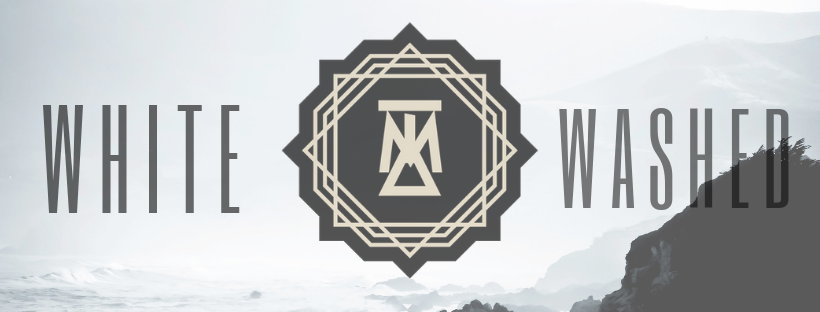

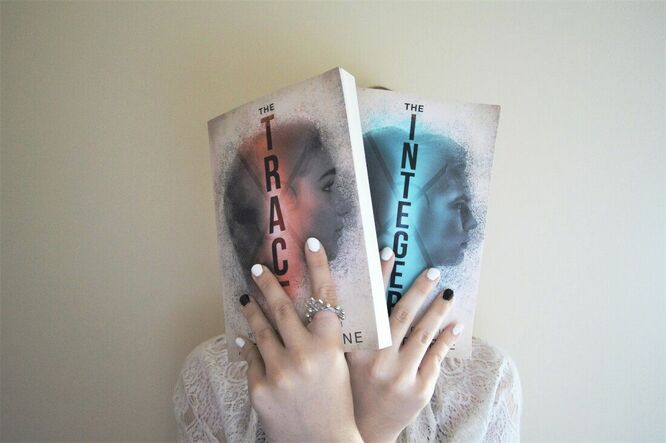
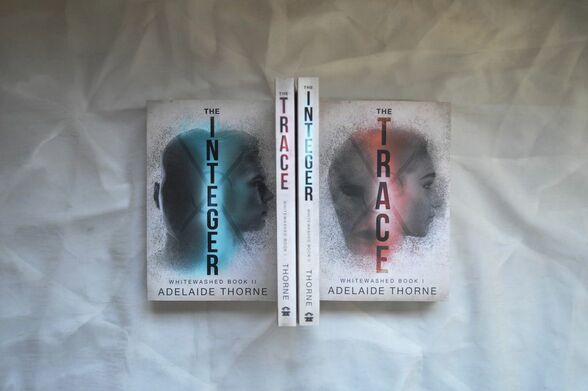

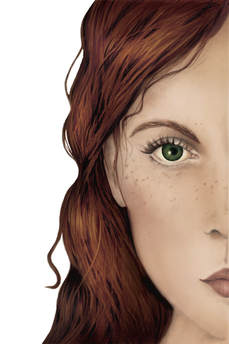
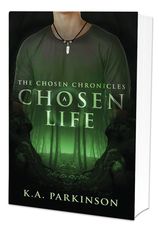

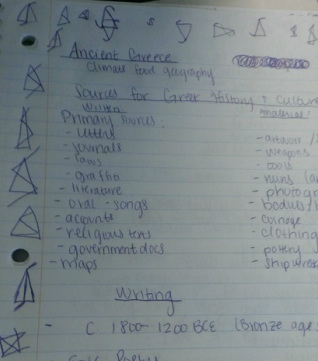
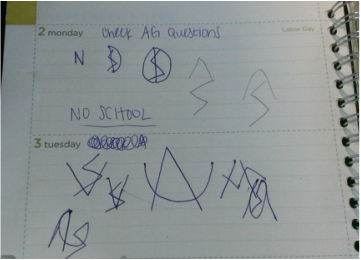
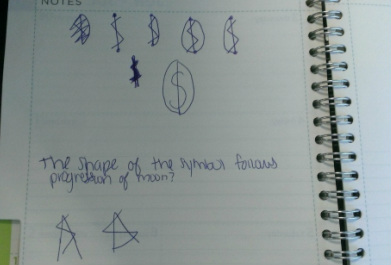
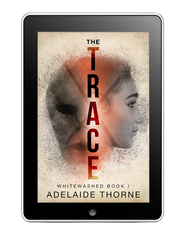
 RSS Feed
RSS Feed